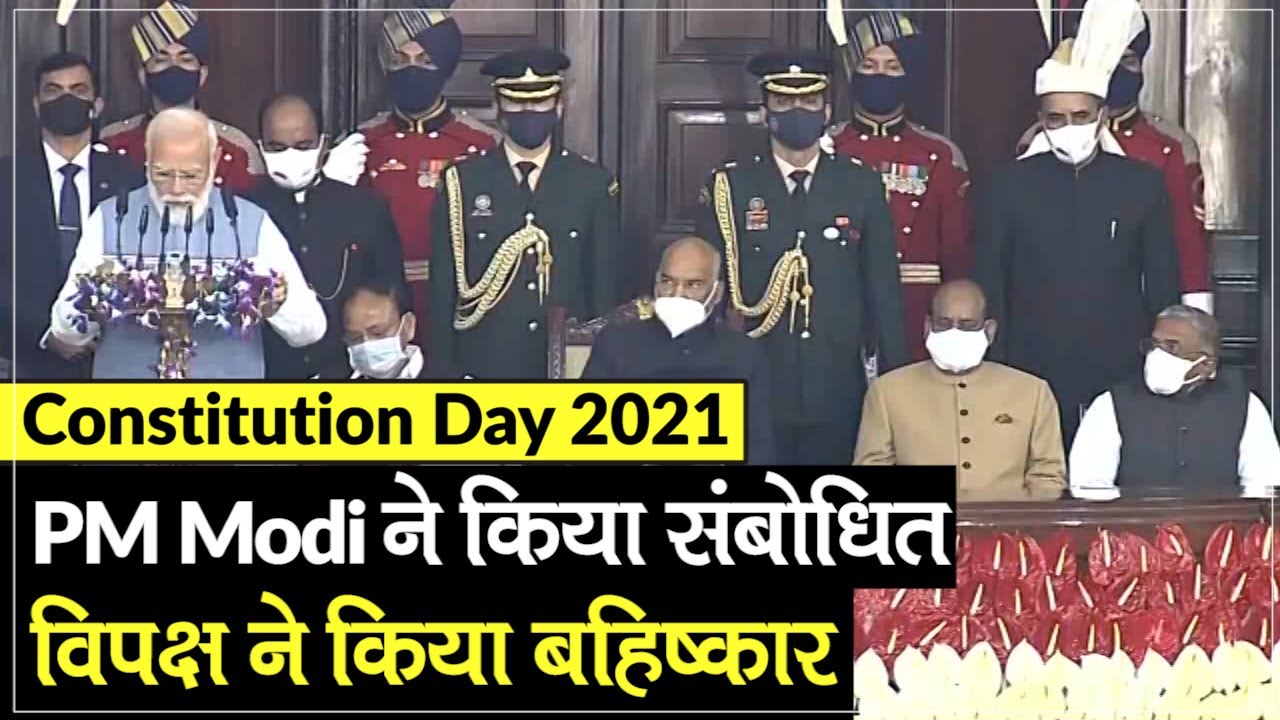


As India celebrates the 75th anniversary of its Constitution, the political scene is abuzz with discussions on its teachings and values. The Congress has requested two days in Parliament to discuss the document, while President Droupadi Murmu stressed its significance in a joint sitting. The Supreme Court also upheld the validity of ‘secular’ and ‘socialist’ in the Preamble, with Vice President Jagdeep Dhankhar emphasizing the need for constructive dialogue to uphold the sanctity of our democratic institutions and promote informed citizenship.
Celebrating the Importance of India's Constitution
India is marking the 75th anniversary of its Constitution, which was adopted on November 26, 1949, following two years of deliberations by the Constituent Assembly. The Constitution is a sacred document that defines the country's framework of government and the fundamental rights and duties of its citizens.
Political Discussion and Significance
As India celebrates this milestone, the importance of the Constitution and its teachings is being widely discussed in the political arena. The Congress party has requested two days in Parliament to debate the document, highlighting its enduring relevance. President Droupadi Murmu, addressing a joint sitting of Parliament, emphasized the Constitution's significance as the guarantor of India's sovereignty, unity, and integrity.
The Supreme Court played a crucial role in upholding the validity of the words "secular" and "socialist" in the Constitution's Preamble. These terms, the court stated, are essential to the foundational principles of the Indian state.
Vice President Jagdeep Dhankhar stressed the need for constructive dialogue to uphold the sanctity of democratic institutions and promote informed citizenship. He urged all stakeholders to engage in meaningful discussions to strengthen India's constitutional framework.
Background
The Indian Constituent Assembly was formed in 1946 following India's independence from British rule. It was tasked with drafting a constitution that would reflect the aspirations of the newly independent nation. The Assembly, which included prominent figures such as Dr. B.R. Ambedkar, spent two years debating and deliberating over the Constitution's clauses and provisions.
The Constitution was finally adopted on November 26, 1949, and it came into effect on January 26, 1950, marking the birth of the Republic of India.
Top 5 FAQs and Answers
1. What are the key features of the Indian Constitution?
The Indian Constitution is the world's longest, with 395 articles and 12 schedules. It establishes a parliamentary system of government with a bicameral legislature, a federal structure with a strong center, and an independent judiciary.
2. What is the significance of the Preamble to the Constitution?
The Preamble to the Constitution defines India as a sovereign, democratic, republic. It also proclaims India's commitment to social, economic, and political justice, as well as liberty, equality, and fraternity.
3. Who was the Chairman of the Constituent Assembly?
Dr. B.R. Ambedkar, also known as the "Father of the Indian Constitution," served as the Chairman of the Constituent Assembly and played a pivotal role in drafting the Constitution.
4. What are the fundamental rights guaranteed by the Constitution?
The Constitution guarantees a wide range of fundamental rights to Indian citizens, including the right to life, liberty, and equality; freedom of speech, expression, and assembly; and the right to property and religious freedom.
5. How has the Constitution been amended over time?
The Constitution has been amended 104 times since its adoption. These amendments have been made to address changing circumstances and to adapt the Constitution to evolving needs and aspirations.

Indian security forces successfully thwarted a possible infiltration attempt by terrorists in Jammu and Kashmir's Kupwara district. The encounter, which took place in the Keran sector, resulted in the elimination of two terrorists. The joint operation, launched on November 7, was based on intelligence inputs and is still ongoing as search operations continue. The Chinar Corps has issued a statement confirming the development and urging readers to refrain from making any derogatory comments in response.

Prime Minister Narendra Modi launched the much-awaited Ernakulam South–Bengaluru Vande Bharat Express via video conferencing from Varanasi. The train, with eight coaches and 600 seats, will cover the journey in 8 hours and 40 minutes with nine scheduled stops. The service, which will begin on November 11, was attended by prominent political figures and media personnel. Three other Vande Bharat services were also inaugurated alongside this launch.

In a strong criticism against the Karnataka government's proposed Tunnel Road Project, BJP MP Tejasvi Surya raised concerns over the lack of feasibility and traffic study. He urged the government to prioritize public transport and complete pending projects before launching new ones. Referring to road fatalities and pedestrian deaths in Bangalore, he emphasized the need for better coordination among departments and efficient use of public funds.

Prime Minister Narendra Modi accused the Congress party of sowing the seeds of division through the omission of important stanzas from the national song Vande Mataram in 1937. Speaking at an event to commemorate 150 years of Vande Mataram, Modi highlighted the importance of the song in India's struggle for independence and its relevance in every era. He also invoked Bankim Chandra Chattopadhyay's vision of a prosperous India and praised the country's resilience against foreign invasions and colonial policies.

In a speech at a BJP office event celebrating the 150th anniversary of Vande Mataram, Chief Minister Mohan Yadav accused the Congress of linking the patriotic song to religion and causing the partition of India. Yadav argued that the song symbolises three Hindu goddesses and that Prime Minister Narendra Modi has given it a new form. However, the Congress did not participate in any events for the occasion.

Maharashtra Chief Minister Devendra Fadnavis has initiated an inquiry into a Pune land deal involving Parth Pawar, the son of NCP chief Ajit Pawar. The move comes amid allegations of corruption and irregularities against Parth, who is seen as a rising political figure in the state. As Parth's public profile grows, observers suggest that his political statements and actions may be reflective of his father's shifting alliances and strategies.

At the state-level inauguration of the 'Vande Mataram: 150th Smaranotsav Ceremony' in Bhopal, Chief Minister Mohan Yadav emphasized the importance of the national song and its role in igniting the flame of freedom in the hearts of millions of Indians. The event, attended by top officials such as DGP Kailash Makwana and Bhopal MP Alok Sharma, featured recitation of the National Song and a band performance by the state police. This ceremony, organized in all 55 district headquarters across Madhya Pradesh, was hailed by Chief Minister Yadav as a prime example of Prime Minister Modi's commitment to national patriotism and preserving heritage.

Maharashtra's deputy chief minister Ajit Pawar met with chief minister Devendra Fadnavis on Friday amidst a controversy surrounding a Rs 300 crore land deal by a company linked to Pawar's son. The Maharashtra government has ordered a probe into the deal and suspended two revenue officials. Opposition parties have called for an independent judicial probe and questioned whether the government's inquiry will be impartial. This is not the first time Pawar has been embroiled in a public scandal, with a previous incident involving an alleged threat to an IPS officer in August.

Maharashtra Chief Minister Devendra Fadnavis has set up an inquiry panel to investigate allegations of corruption and irregularities in the sale of government land in Pune to a company linked to NCP leader Ajit Pawar's son. The sale of 40 acres of land worth ₹1,800 crore to Amedea Enterprises LLP, where Parth Pawar is a partner, for just ₹300 crore and a stamp duty waiver of ₹21 crore has raised suspicion. The government has assured a thorough investigation and strict adherence to rules.

As India celebrates 150 years of Vande Mataram, Prime Minister Narendra Modi has accused the Congress of removing crucial stanzas from the national song in 1937, leading to the division of the country. The prime minister emphasized the significance of Vande Mataram in India's freedom struggle and called for the younger generation to understand why the song was divided. However, Congress president Mallikarjun Kharge has refuted PM Modi's claims and alleged that the BJP and RSS have historically neglected Vande Mataram and instead continue to sing their own slogan.